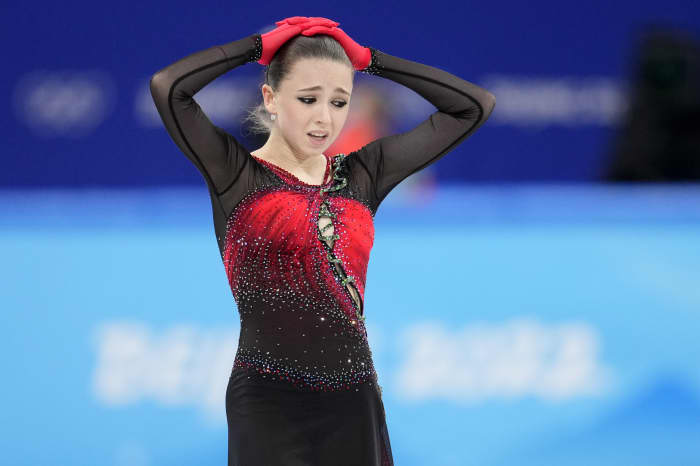This post was originally published on this site
““Can we get a solid answer on the difference of her situation and [mine]?” ”
Last summer, American sprinter Sha’Carri Richardson was banned from competing at the postponed 2020 Tokyo Olympics after testing positive for marijuana.
Last week, it was revealed that Russian figure skater Kamila Valieva tested positive for the heart drug trimetazidine in December, which didn’t come to light until last week — after she had already helped the Russian Olympic Committee win the team gold.
But the international Court of Arbitration for Sport, an independent institution that settles sports-related legal disputes, has ruled that Valieva, 15, may still compete in the women’s figure skating competition on Tuesday and Thursday while her case is being reviewed. Were she to win a medal, however, it could still potentially be stripped away from her — even as the ROC figure skating team’s gold medal still hangs in the balance until this case is resolved. What’s more, the IOC says there will be no medal ceremony if Valieva places in the top three at the women’s figure skating final.
Read more: Russian figure skater cleared to compete in Olympics despite failing drug test
But Valieva still gets to skate. And Richardson, 21, is among those who want to know why Valieva was given the go-ahead to compete at the Games while her case is being sorted out, yet Richardson was suspended by the U.S. Anti-Doping Agency, and was left off the USA Track and Field Olympic roster, after testing positive for a chemical found in marijuana.

Sha’Carri Richardson is among those asking why Kamila Valieva still gets to compete in the Beijing Winter Olympics.
Steph Chambers/Getty Images
Richardson said that she had used marijuana to cope with her mother’s recent death. “I was trying to hide my pain,” she told NBC at the time.
Read more: Sha’Carri Richardson has officially been left off the USA Track and Field roster
“Can we get a solid answer on the difference of her situation and [mine]?” she tweeted on Monday morning. “My mother died and I can’t run and was also favored to place top 3. The only difference I see is I’m a black young lady.”
This was a sentiment shared by many on social media on Monday morning, as both “Kamila Valieva” and “Sha’Carri Richardson” trended on Twitter.
The Court of Arbitration for Sport said that it gave Valieva a favorable decision in part because she was a minor or “protected person” and was subject to different rules from an adult athlete. It also noted that she tested clean in Beijing and that there were “serious issues of untimely notification” of her positive test.
And Valieva has also received plenty of support over the past several days. Retired German Olympic figure skating champion Katherine Witt wrote on Facebook that the adults responsible for Valieva’s training and medical care should be held responsible for the failed drug test — not the young skater.
“As an athlete, you follow the advice of your loved ones and, in this case, always first of all the coaching and medical team,” Witt wrote on Facebook last Thursday. “You just trust that they know what is right and what is wrong.”
“She is not to blame here,” Witt added. “If anything, the responsible adults should be banned from sport forever.”
Some on Twitter also called out the adults in Valieva’s life, including her controversial coach Eteri Tutberidze.
“Kamila Valieva is about to get banned for failing a performance enhancing drug test and I blame no one but her crazy abusive coach and her parents for letting their ambitions get in the way of protecting this poor child,” wrote one viewer.
“Kamila Valieva is not the enemy, she is the victim,” added another.

Kamila Valieva, 15, is at the center of the biggest doping story of the Beijing Games.
AP Photo/Natacha Pisarenko
It should be noted that these tweets are just a sampling of the varied responses around the Valieva controversy.
Trimetazidine, the heart medication that Valieva tested positive for, helps prevent angina attacks and treats the symptoms of vertigo. It can also increase blood flow efficiency and improve endurance, however, so it is on the World Anti-Doping Agency’s banned drugs list under “hormone and metabolic modulators.”
While restrictions on marijuana use have been loosened at the Olympics — such as potential bans being reduced from two years to the 30-day suspension that Richardson served — there are calls to re-evaluate the rules.
The USATF said last summer that it was “incredibly sympathetic toward Sha’Carri Richardson’s extenuating circumstances” and “fully agrees” that international rules regarding marijuana should be re-evaluated.
“So while our heartfelt understanding lies with Sha’Carri, we must also maintain fairness for all of the athletes who attempted to realize their dreams by securing a place on the U.S. Olympic Track & Field Team,” the statement read.
The figure skating event will air live at 5 a.m. ET on Tuesday ad Thursday. Here’s a guide on where to watch the Beijing Olympics.


